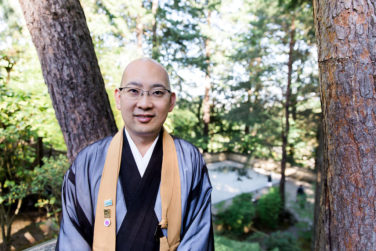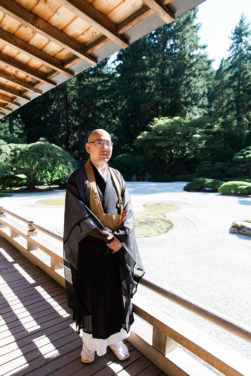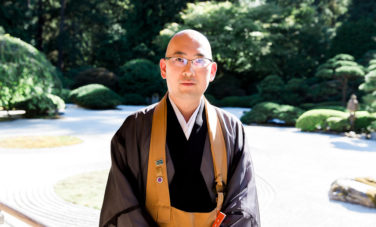“Let the important things go out of mind:” Rev. Daiko Matsuyama on gardening and mindfulness
 Reverend Daiko Matsuyama is deputy head priest of Taizō-in temple, part of Kyoto’s Myōshinji temple complex associated with the Rinzai school of Zen Buddhism. Considered to be a future leader of the Buddhist community in Japan, he has earned praise as a cultural ambassador for Japan through his frequent lectures at embassies, TED talks, and other activities. His international outreach efforts have included participating in the “InterFaith: Run for a United World” marathon held under the patronage of the Dalai Lama, and attending the World Economic Forum in Davos. Rev. Matsuyama comes to Portland in September to present at the International Japanese Garden Conference. Portland Japanese Garden invited him to talk about his temple’s garden and what lessons we can take in focus and mindfulness from the practice of daily life at a Buddhist temple.
Reverend Daiko Matsuyama is deputy head priest of Taizō-in temple, part of Kyoto’s Myōshinji temple complex associated with the Rinzai school of Zen Buddhism. Considered to be a future leader of the Buddhist community in Japan, he has earned praise as a cultural ambassador for Japan through his frequent lectures at embassies, TED talks, and other activities. His international outreach efforts have included participating in the “InterFaith: Run for a United World” marathon held under the patronage of the Dalai Lama, and attending the World Economic Forum in Davos. Rev. Matsuyama comes to Portland in September to present at the International Japanese Garden Conference. Portland Japanese Garden invited him to talk about his temple’s garden and what lessons we can take in focus and mindfulness from the practice of daily life at a Buddhist temple.
PJG: Let’s talk about your relationship with your garden. Traditionally, it’s not just viewing and walking through the garden that are a part of Zen practice, but actively caring for it. How much time, generally, do you yourself spend tending the garden at Taizo-in?
 Rev. Daiko Matsuyama: In a Zen monastery, cleaning or tending garden is regarded one of the most important activities. We normally spend 2-3 hours every morning for cleaning. We cherish seated meditation, of course, but also moving meditation — like cleaning, cooking, and calligraphy. Chinese Zen master Hyakujyo Ekai said “If I do not work, I should not eat.” in the late 8th century. From that time, cleaning or moving meditation have been cherished in the Zen monastery. There is a teaching in Zen that says struggling in movement has a trillion times more value than struggling in sitting in silence. If we just sit, it is nothing. The attitude is very important. Intention of unintention.
Rev. Daiko Matsuyama: In a Zen monastery, cleaning or tending garden is regarded one of the most important activities. We normally spend 2-3 hours every morning for cleaning. We cherish seated meditation, of course, but also moving meditation — like cleaning, cooking, and calligraphy. Chinese Zen master Hyakujyo Ekai said “If I do not work, I should not eat.” in the late 8th century. From that time, cleaning or moving meditation have been cherished in the Zen monastery. There is a teaching in Zen that says struggling in movement has a trillion times more value than struggling in sitting in silence. If we just sit, it is nothing. The attitude is very important. Intention of unintention.
PJG: Could you talk a little bit about the different spaces in your garden? Which are the most powerful for you, and how can a garden support the very central Buddhist idea?
We have three different gardens in Taizo-in: a pond strolling garden, a dry landscape garden and a roji, a tea garden. I feel that the dry landscape garden is the most powerful one, because it has survived for more than 500 years. It stands such long time here in Taizo-in. Sense of season is one of the most important things in Japanese culture. It is easy to place gorgeous flowers or plants in the garden, because that is easy to recognize. But Japanese people love a subtle sense of season, like slight change in color.
PJG: One of the central ideas of Buddhism is eliminating things from our lives like desire or craving. How can a garden, whether a monastery garden or a backyard, support one’s effort to do that?
DM: We tend to stick to something, even the idea of eliminating things. But if we try to eliminate something, it becomes more difficult. Nature knows very well. However hard we try to clean the garden, it seems meaningless on windy days. We learn something from nature.
PJG: You’ve spoken and written a lot about mindfulness, an elusive quality for many of us. What do you recommend people surround themselves with to make it more possible to be mindful?
 For example, even once in a week, please try to concentrate on eating a meal. Normally we chat, watch TV, use our phones while we eat. But if you concentrate just on eating food, you can feel the delicate taste of every ingredient and the subtle smells of the meal. If you want to have fulfilling meals, you do not have to eat luxurious ingredients. Just enjoy fully the meal in front of you.
For example, even once in a week, please try to concentrate on eating a meal. Normally we chat, watch TV, use our phones while we eat. But if you concentrate just on eating food, you can feel the delicate taste of every ingredient and the subtle smells of the meal. If you want to have fulfilling meals, you do not have to eat luxurious ingredients. Just enjoy fully the meal in front of you.
PJG: You published a book a few years ago called Let the Important Things Go Out of Mind. I love the counter-intuitive wording of that title. Could you talk about the philosophy behind that?
DM: If you remind yourself and repeat “this is important,” that means you have not mastered that task. Do you remind yourself when you breathe? Do you check every movement when you walk?
If you train yourself over and over, you will forget — and master the important thing.
PJG: I think a nice way to close this is for you to say a few things about Taru o shiru.
DM: Taru o shiru means to be content with what you are and what you have. I believe hapiness can be expressed by this equation: Happiness = What you have / What you desire. There are two ways to increase your happiness. One is to gain more, and the other is to want less. The Buddhist way is the second one. Of course if you acquire a new thing, it is exciting and makes you happier. But humans are greedy. Once you get something you want more. So if you desire more, happiness lessens.
Rev. Daiko Matsuyama is one of more than 50 garden practitioners and researchers presenting at the International Japanese Garden Conference hosted by the Garden and presented by the North American Japanese Garden Association from Sept. 29-Oct. 1.